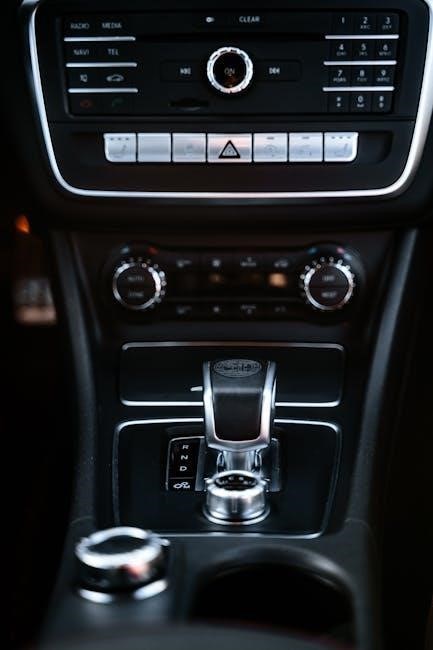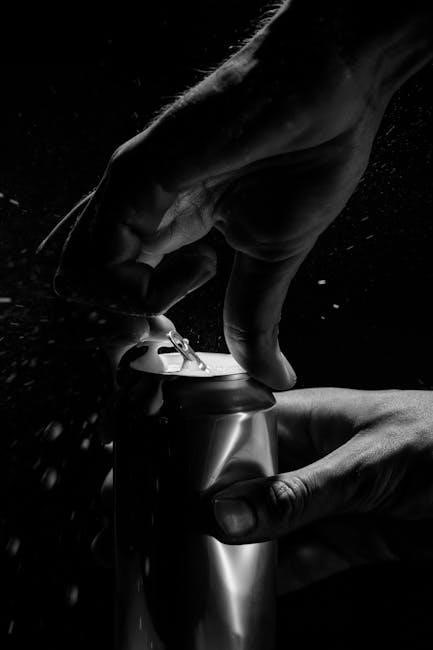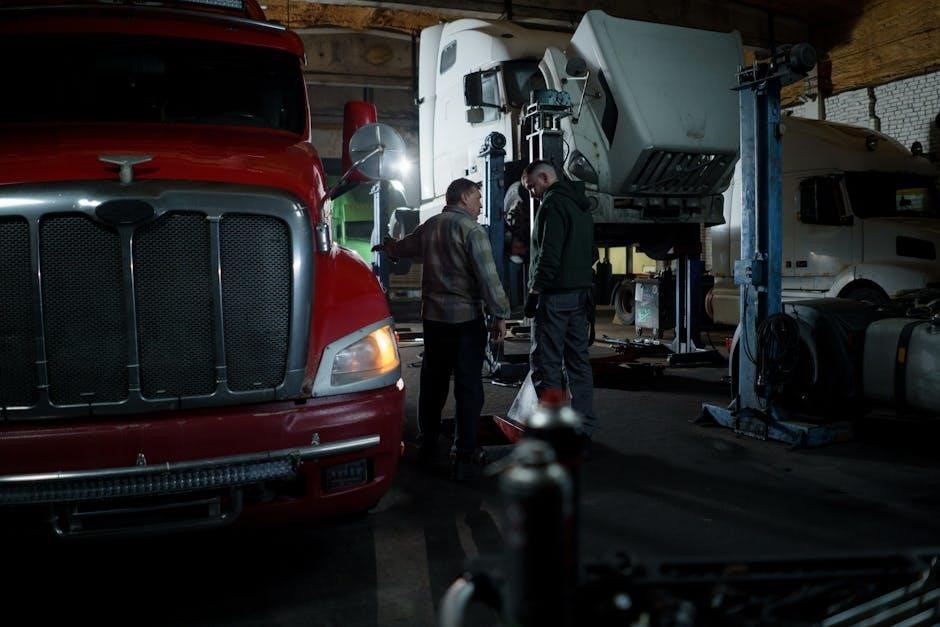Transmission conversion involves changing a car from manual to automatic, a complex process requiring professional mechanic expertise and significant financial investment, using various components and tools daily․
Understanding the Basics of Manual and Automatic Transmissions
To comprehend the process of changing a car from manual to automatic, it is essential to understand the fundamental differences between manual and automatic transmissions․ Manual transmissions rely on the driver to manually change gears using the clutch and gearshift, whereas automatic transmissions use a complex system of sensors, hydraulic pumps, and gearsets to automatically change gears․ The basic components of a manual transmission include the gearbox, clutch, and gearshift, while an automatic transmission consists of a torque converter, planetary gearset, and hydraulic control unit․ Understanding these basics is crucial in determining the feasibility of converting a manual transmission to an automatic one, and the potential challenges and costs associated with such a conversion․ This knowledge will help individuals make informed decisions about their vehicle’s transmission system․ Various online resources provide detailed information on transmission systems․
Feasibility of Converting a Manual to an Automatic
Converting a manual to automatic is feasible but requires significant investment and professional expertise daily using various components and tools․
Challenges and Costs Associated with the Conversion Process
The conversion process from manual to automatic transmission is complex and costly, requiring significant financial investment and professional expertise․ The process involves replacing the entire manual transmission system with an automatic one, which can be time-consuming and labor-intensive․ Additionally, the cost of the conversion can be prohibitively expensive, making it a less viable option for many car owners․ The challenges associated with the conversion process include finding compatible components, ensuring proper installation, and troubleshooting any issues that may arise․ Furthermore, the conversion process may also require modifications to the car’s electrical system, which can add to the overall cost and complexity of the process․ Overall, the challenges and costs associated with the conversion process make it a significant undertaking that requires careful consideration and planning․ The cost can range from a few thousand dollars to over ten thousand dollars․

Major Components of an Automatic Transmission
Automatic transmission components include torque convertor, planetary gear unit, hydraulic control unit, and clutches, working together to provide smooth gear shifting and efficient power transmission daily always․
Key Parts Including Torque Convertor and Planetary Gear Unit
The torque convertor and planetary gear unit are crucial components in an automatic transmission, working together to provide smooth gear shifting and efficient power transmission․
The torque convertor is responsible for connecting and disconnecting the engine from the transmission, while the planetary gear unit provides the various gear ratios needed for different driving conditions․
These components are designed to work together seamlessly, providing a smooth and efficient driving experience․
The planetary gear unit is made up of several gears and clutches, which work together to provide the different gear ratios․
The torque convertor, on the other hand, uses a fluid-filled chamber to connect and disconnect the engine from the transmission, allowing for smooth acceleration and deceleration․
Overall, the torque convertor and planetary gear unit are essential components in an automatic transmission, and are designed to work together to provide a smooth and efficient driving experience, with various components and tools used daily․

Specialist Services for Gearbox Overhaul and Conversion
Specialist services offer gearbox overhaul and conversion, providing professional mechanic expertise for manual to automatic conversions, using various components and tools, with daily servicing options available․
Importance of Consulting a Professional Mechanic for the Job
Consulting a professional mechanic is crucial when considering a manual to automatic transmission conversion․ They will assess the vehicle’s compatibility and provide a detailed report on the feasibility of the conversion․ A professional mechanic will also outline the necessary steps and components required for the conversion, including the torque convertor and planetary gear unit․ Additionally, they will discuss the potential costs and challenges associated with the process, ensuring that the owner is fully informed before making a decision․ With their expertise, the conversion can be completed efficiently and effectively, minimizing the risk of errors or damage to the vehicle․ By consulting a professional mechanic, car owners can ensure a successful and reliable transmission conversion, tailored to their specific needs and vehicle requirements, using various components and tools available in the market today for such conversions․

Electrical System Considerations for Conversion
Complex wiring and compatibility issues arise during conversion, requiring careful consideration and professional expertise to ensure a smooth transition to automatic transmission daily always․
Complexity of Wiring and Compatibility Issues
The process of converting a manual transmission to an automatic involves complex wiring and compatibility issues that must be addressed․ This includes ensuring that the electrical system of the car is compatible with the new transmission, and that all necessary wiring and components are installed correctly․ The complexity of the wiring and compatibility issues can vary depending on the make and model of the car, as well as the type of transmission being installed․ In some cases, it may be necessary to consult with a professional mechanic or electrical engineer to ensure that the conversion is done correctly and safely․ Additionally, the use of specialized tools and software may be required to diagnose and repair any issues that arise during the conversion process, and to ensure that the car’s electrical system is functioning properly․ The conversion process requires careful planning and execution to avoid any potential problems․

Alternative Solutions and Modifications
Exploring options for coil on plug and engine swaps with professional mechanic expertise and tools is necessary for modification success daily always․
Exploring Options for Coil on Plug and Engine Swaps
Coil on plug and engine swaps are alternative solutions to consider when changing a car from manual to automatic․ These modifications require professional mechanic expertise and specialized tools․ The process involves replacing the existing engine with a new one that is compatible with the desired transmission type․ Additionally, the coil on plug system must be installed to ensure proper engine performance․ This system provides a more efficient and reliable way to deliver power to the engine․ With the right tools and expertise, coil on plug and engine swaps can be a viable option for those looking to change their car’s transmission․ It is essential to research and understand the requirements and costs associated with these modifications before making a decision․ By exploring these options, individuals can make an informed choice about the best approach for their vehicle․
on the Practicality of Conversion
Conversion is often impractical due to high costs and complexity, requiring significant investment and expertise, making it a less desirable option for many car owners daily always․
Final Thoughts on the Cost, Complexity, and Advisability of the Process
The process of converting a manual car to automatic is complex and costly, requiring significant investment and expertise․ Many car owners may find it impractical due to the high costs involved․ Additionally, the complexity of the process can be overwhelming, making it a less desirable option for many․ The conversion process requires a thorough understanding of the car’s electrical system, transmission, and engine, making it a challenging task․ Furthermore, the cost of the conversion can be prohibitively expensive, making it a less viable option for many car owners․ Overall, the decision to convert a manual car to automatic should be carefully considered, taking into account the cost, complexity, and advisability of the process, and weighing the potential benefits against the potential drawbacks, and considering alternative options, such as purchasing an automatic car․